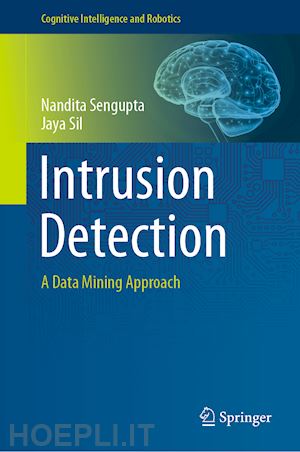
Questo prodotto usufruisce delle SPEDIZIONI GRATIS
selezionando l'opzione Corriere Veloce in fase di ordine.
Pagabile anche con Carta della cultura giovani e del merito, 18App Bonus Cultura e Carta del Docente
This book presents state-of-the-art research on intrusion detection using reinforcement learning, fuzzy and rough set theories, and genetic algorithm. Reinforcement learning is employed to incrementally learn the computer network behavior, while rough and fuzzy sets are utilized to handle the uncertainty involved in the detection of traffic anomaly to secure data resources from possible attack. Genetic algorithms make it possible to optimally select the network traffic parameters to reduce the risk of network intrusion.
The book is unique in terms of its content, organization, and writing style. Primarily intended for graduate electrical and computer engineering students, it is also useful for doctoral students pursuing research in intrusion detection and practitioners interested in network security and administration. The book covers a wide range of applications, from general computer security to server, network, and cloud security.
Chapter 1. Introduction.- Chapter 2. Discretization.- Chapter 3. Data Reduction.- Chapter 4. Q-Learning Classifiers.- Chapter 5. Hierarchical Q - Learning Classifier.- Chapter 6. Conclusions and Future Research.
Nandita Sengupta holds a Bachelor of Engineering degree from the Indian Institute of Engineering Science and Technology (IIEST), Shibpur, India (formerly known as Bengal Engineering College, Shibpur, Calcutta University). She completed a postgraduate management course in Information Technology at IMT, an M.Tech. (Information Technology) and Ph.D. in Engineering (Computer Science and Technology) at IIEST, Shibpur, India. She has worked in the field for 29 years, including 11 years in industry and 18 years teaching IT various subjects. She is currently an Associate Professor at the University College of Bahrain, Bahrain. Her areas of interest are analysis of algorithms, theory of computation, soft computing techniques, network computing and security.
Jaya Sil has been a Professor at the Department of Computer Science and Technology at the Indian Institute of Engineering Science and Technology, Shibpur, since 2003. She completed her B.E. in Electronics and Telecommunication Engineering at B.E. College, at Calcutta University, India, in 1984, and M.E. (Tele) at Jadavpur University, Kolkata, India, in 1986. She received her Ph.D. (Engg) degree in the field of artificial intelligence from Jadavpur University, Kolkata, in 1996, and started her teaching career in 1987 as a lecturer at the Department of Computer Science and Technology at B.E. College, Howrah. She worked as a Postdoctoral Fellow at Nanyang Technological University, Singapore, from 2002 to 2003. She undertook collaborative research in Husar at the Bioinformatics Lab, Heidelberg, Germany, and also visited Wroclaw University of Technology, Poland, in 2012. She was awarded an INSA Senior Scientist Fellowship. Prof. Sil has delivered tutorials and invited talks, and has also presented papers and chaired sessions at various international conferences in abroad and India. She has published more than 200 research papers (including conference papers) in the field of bioinformatics, machinelearning and image processing along with applications in a variety of engineering fields. She has published numerous books and several book chapters and acted as a reviewer for IEEE, Elsevier, and Springer Journals.











Il sito utilizza cookie ed altri strumenti di tracciamento che raccolgono informazioni dal dispositivo dell’utente. Oltre ai cookie tecnici ed analitici aggregati, strettamente necessari per il funzionamento di questo sito web, previo consenso dell’utente possono essere installati cookie di profilazione e marketing e cookie dei social media. Cliccando su “Accetto tutti i cookie” saranno attivate tutte le categorie di cookie. Per accettare solo deterninate categorie di cookie, cliccare invece su “Impostazioni cookie”. Chiudendo il banner o continuando a navigare saranno installati solo cookie tecnici. Per maggiori dettagli, consultare la Cookie Policy.